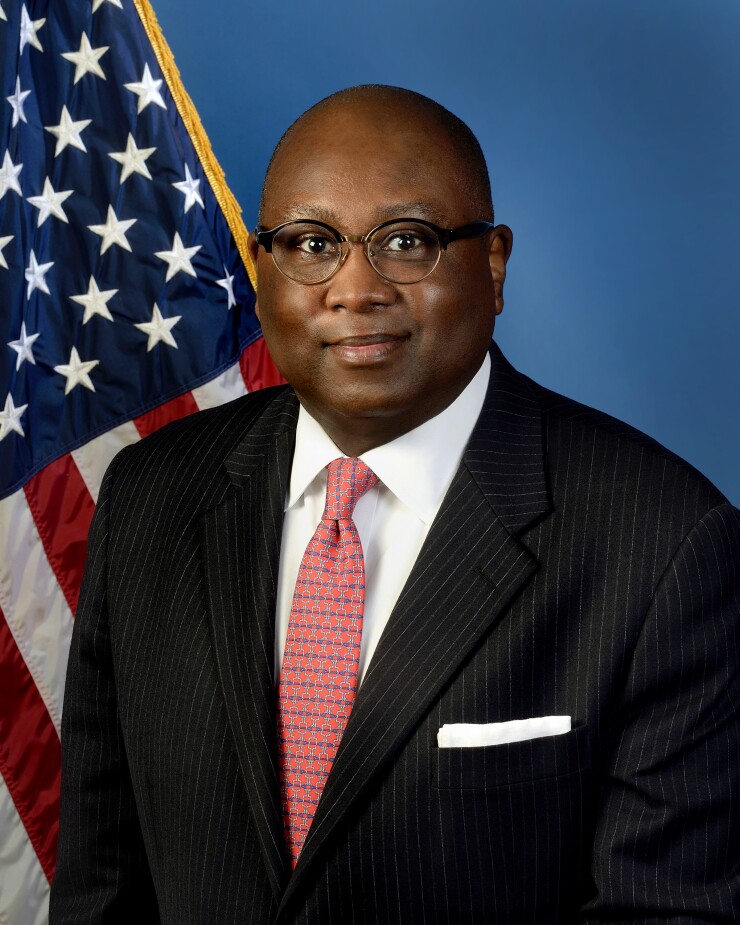President Trump on Monday named Rodney Hood chairman of the National Credit Union Administration board.
Hood succeeds Mark McWatters, who joined the board in 2014 and was elevated to chairman in 2017 when Trump took office. A previous vice chairman of the NCUA board, Hood has also served at the Department of Agriculture and worked in a variety of positions across the banking sector.
McWatters is expected to remain on the board until at least Aug. 2, when his term expires. Most board members stay on past their term until a successor has been confirmed.
Hood, whose term expires on Aug. 2, 2023, was confirmed last month along with board member Todd Harper, who was sworn into the board later in the day.
“Over the next four years, I will be especially honored to lead the talented and professional NCUA team while doing my level best to ensure that they have the necessary resources to respond nimbly to today’s market risks and emerging issues,” Hood said in a statement. “As chairman, I look forward to enhancing and modernizing the federal credit union charter, addressing the issues of capital reform and cyber security, creating opportunities for credit unions to serve vulnerable communities and reducing regulatory burdens.”

Hood’s focus on helping credit unions reach “vulnerable communities” would seem to be in line with remarks during his confirmation about the need to increase credit union access for consumers in rural communities, though that is likely to be tested quickly during his tenure.
Much of what NCUA can do regarding increasing rural access is tied up in its controversial field of membership rule, half of which was struck down by a federal judge in 2017. A hearing for an appeal in the case is scheduled for April 16.
McWatters’ tenure as chairman was plagued by a series of negative national news coverage, most recently a Washington Post story

McWatters also reintroduced the agency’s request for
Hood’s appointment to the chairmanship was warmly received by the industry – perhaps not surprising since many key figures in the movement worked with him when he served on the board from 2005 to 2010.
"NAFCU congratulates Rodney Hood on being named NCUA Board chairman, and we look forward to working with him as he leads the agency," Dan Berger, president and CEO of the National Association of Federally-Insured Credit Unions, said in a statement. "With his previous experience serving on the NCUA board and industry knowledge, Mr. Hood will be an asset to the agency as it tackles some of credit unions' most pressing problems. We also appreciate Mark McWatters' efforts as chairman to bring about regulatory relief for the industry and transparency at the NCUA."
The Credit Union National Association spoke in similar terms.
“We congratulate Rodney Hood on being named NCUA chair and thank former Chair McWatters for his service to credit unions during his time as chairman. We believe it is critical for the effective operation of the agency that the board be filled by three members,” said CUNA President and CEO Jim Nussle. “As such, we believe a full board will be most able to address the varied issues facing the credit union industry.”
“We are pleased that Chairman Hood noted he will address capital reform, cybersecurity and the strengthening the federal credit union charter,” said Lucy Ito, president and CEO of the National Association of State Credit Union Supervisors. “We have long held that it is critical that a supplemental capital rule be in place ahead of the next financial crisis to help protect the National Credit Union Share Insurance Fund from losses. In recent years, states have taken the lead on cybersecurity and charter modernization and NASCUS, as the voice of the state credit union system, looks forward to sharing state experience on regulatory and supervisory innovation to protect credit unions from cyber threats and enhance the federal charter to promote credit union growth and stability.”
NASCUS has advocated in the past that the NCUA board should be expanded from three seats to five, along with the requirement that at least one board memher have experience with the state credit union system.
This story was updated at 3:10 p.m. on April 8, 2019.





